The True Nature of the COVID-19 Crisis
The emergence of the novel coronavirus drastically changed the world, and brought enormous damage to the economy, society and culture. We all realize that cross-border cooperation is indispensable for responding to the global pandemic. In international politics, however, we see the prevalence of friction between governments, conspiracy theories and prioritization of national interests. Perhaps the shock was so great that we don't yet understand the true nature of the crisis.
What is the true nature of the COVID-19? What changes will the COVID-19 crisis bring to Asia? We posed these questions to debaters from around Asia in the 6th session entitled "Democracy at a Crossroads."
Participants in the discussion were: Goenawan Mohamad (playwright, poet) from Indonesia, Urvashi Butalia (writer, publisher) from India, and OGUMA Eiji (Keio University) and HORIBA Akiko (Sasakawa Peace Foundation) from Japan.
Mr. Mohamad has witnessed the turbulent history of the modern age as a literary figure and a journalist. He cited the warning from the World Health Organization against "vaccine nationalism" and expressed concern about how international efforts to fight the novel coronavirus is being disrupted by nationalistic agendas and protectionism.
Moreover, Mr. Mohamad pointed out that the United States is no longer playing the leadership role it was playing in the post-war world, turning instead to "America first" policies. Its leadership is waning, and it is still unclear if Japan or Europe can fill the gap. Meanwhile, China's presence in the world is growing. Mr. Mohamad has been keeping an eye on the current situation of international politics from the standpoint of Southeast Asia and warns that without democratic nations leading the way and becoming a model for crisis response, authoritarian rule by technocrats may spread around the world.
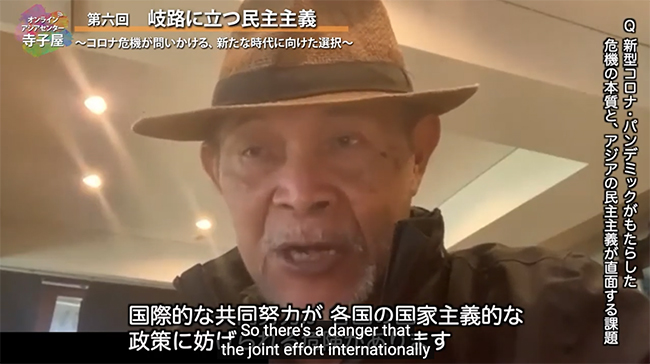
As India's first feminist publisher, Ms. Butalia has empowered Indian women and contributed to the development of civil society. According to her, the foundation of democracy in the world is now being shaken. Democracy is built on an interdependent relationship of trust between a state and its citizens. The state is expected to ensure peace and stability for its citizens, and citizens are expected to act as the conscience of the state. But now, this relationship of trust has been lost. The pandemic has revealed how ill-prepared governments are to deal with the crisis, and governments are overreacting to the criticisms from citizens. For many states, citizens now seem to be the enemy, Ms. Butalia says.
The impact on women is particularly serious. India is a major manufacturer of contraceptives, but the industry came to a halt when international trade was suspended due to the COVID-19 crisis. In a patriarchal society where women's right to choose is limited, the rise in unprotected sex, sexually transmitted diseases and unwanted pregnancies are negatively impacting women's health.
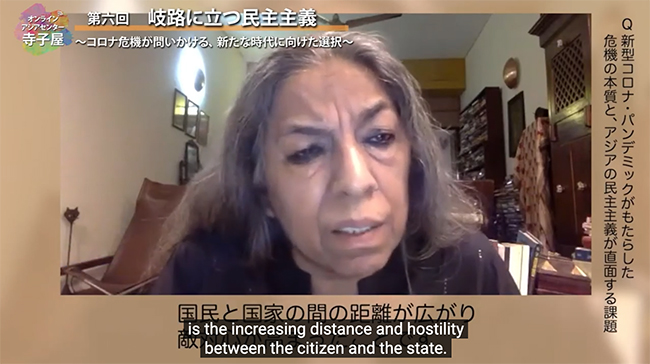
Prof. Oguma has provided fresh perspectives and analyses that overturn common beliefs about society. He explained how the COVID-19 crisis has impacted non-regular and self-employed workers who compose "the lower part of the two-tier structure" in Japan. According to a labor study conducted in August 2020, the number of non-regular employees dropped by 1.2 million from the same month the year before to 20.7 million, while regular workers, particularly in IT and nursing sectors, increased by 350,000 to 35.35 million. There is also data showing that sectors with the biggest drops in annual income are expected to be, in order, sole proprietors, non-regular workers, and regular employees.
Similar trends can be seen around the world. Internationally, "the lower part of the two-tier structure" is called "the informal sector." The sector was on a growing trend as globalization progressed, and the growth is now accelerating as a result of the economic crisis. The widening of disparities and divisions caused by globalization and economic crises tends to give rise to dysfunctional democracies and authoritarianism, and it appears that the COVID-19 crisis is accelerating this shift.
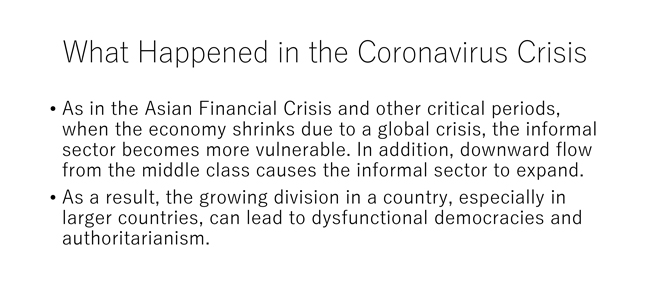
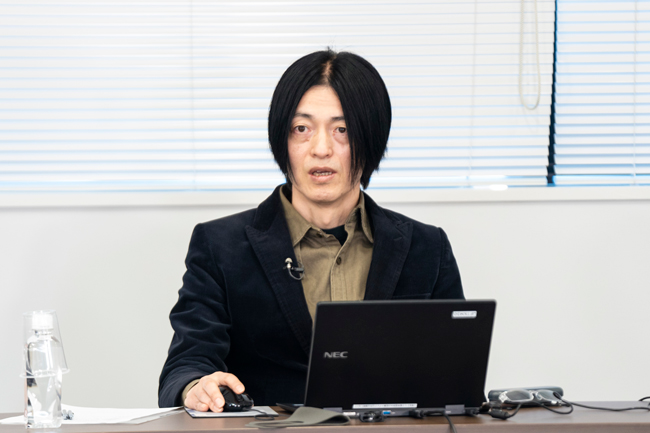
Dr. Horiba has been engaged in peacebuilding activities in conflict regions in Asia. Like the other three speakers, she noted that vulnerable groups, regions and people were most impacted by the COVID-19 crisis. In recent years, there have been forces at work in Asian countries, trying to put the brakes on democratization and to limit spaces where citizens participate in activities, freely exchange opinions and find solutions for various issues. Such forces were recognized as impediments to peacebuilding. And now, with the sudden emergence of the COVID-19 crisis, governments are using the pandemic as an excuse to shrink and stifle citizens' activities even further.
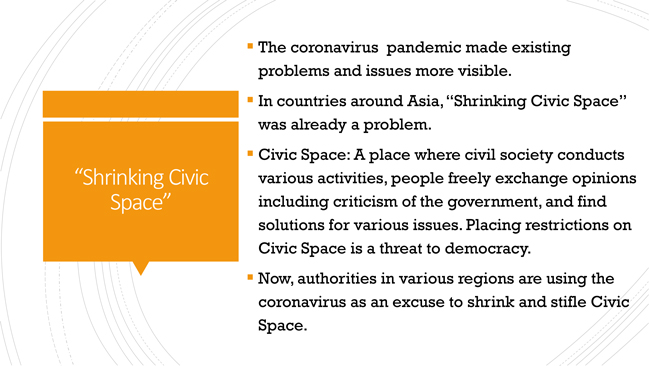
Since the start of the pandemic, everyone has been caught up in the major changes in their lives. Governments and media are so preoccupied with responding to the pandemic that news in other countries and other issues are taking a backseat. Even before the pandemic, there were regions of conflict in Southeast Asia that received little media coverage, and now they are almost completely forgotten, Dr. Horiba said, taking the example of the conflict in Thailand's deep south.
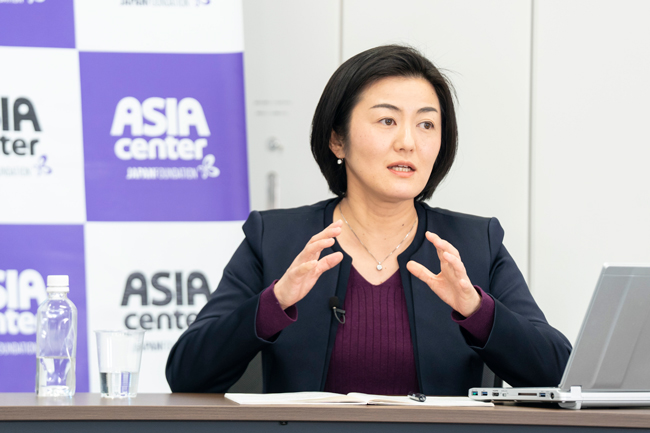
The consensus among the four experts was that the current crisis situation did not appear out of nowhere. For example, social division was recognized as an issue even before the pandemic. The COVID-19 crisis is aggravating existing issues at an alarming pace, however, and now, the world has come to a point where the problems can no longer be delayed.
- Next Page
- Beyond the Crisis






